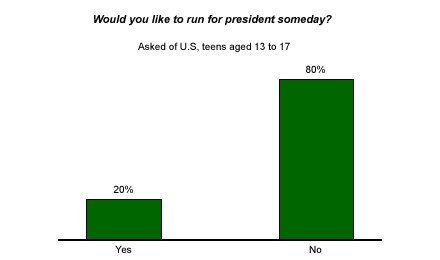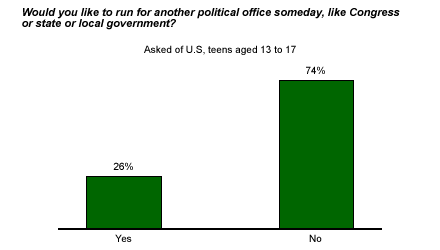Although teens legally won't be eligible to run for president for at least 15 more years, some are already dreaming of seeing their names on the ballot someday. Twenty percent of U.S. teens, according to a recent Gallup Youth Survey*, share a common bond with both George W. Bush and John Kerry -- they want to be president.

For 14-year-old Byron from Omaha, Neb., the question is a no-brainer -- he definitely wants to occupy the White House someday. "The president is the leader of the free world," Byron says. "Even though there's a balance of power, it's [the presidency] really more powerful than Congress and more powerful than the Supreme Court."
As president, Byron would like to make some positive changes. "I'd like to leave the nation a little bit better for the next generation."
Brittney, a 14-year-old from Lincoln, Neb., aligns with the 80% of teens who have no desire to run for president. "I wouldn't want the weight of everybody's lives being in my hands," she says.
Presidential Hopefuls
Although no woman has been elected president yet, girls seem undaunted -- they are no less likely than boys to harbor presidential ambitions. Twenty percent of both sexes say they'd like to run for president someday.
Additionally, roughly equal numbers of Republican, Democratic, and politically independent teens have desires to be president.
In fact, there are few demographic differences in teens' responses to this question. But teens who say they have given the current presidential election a lot of thought are somewhat more likely than those who haven't to aspire toward a presidential bid of their own.
Byron is no exception. He has been keeping close tabs on this election, checking out election coverage and discussion in online forums, the newspaper, and newsmagazines. Brittney says she hasn't been following the election closely because she hasn't had the time.
Other Political Ambitions
Most teens aren't eying the White House, but are they interested in running for another political office, such as Congress or state or local government? The Gallup Youth Survey indicates that teens are slightly more likely to consider politics at this level; 26% of teens say they'd like to run for Congress or another political office, while 74% say they would not.
Again, interest in other political offices runs much higher among teens who have given substantial thought to the current election than among those who haven't: 37% of teens who have thought about the election a lot would consider running for office, while 21% of teens who haven't thought much about the election would consider a bid.

Take It From Someone Who Knows
Republican Sen. Chuck Hagel of Nebraska says he's always been interested in government and politics, but can't point to one age at which he developed a particular interest.
"I've been interested throughout my life," Hagel says. "I have always believed that if there was an opportunity to seek elective office, and it fit my circumstances -- my family, my business, my life -- then I would like to take advantage of that opportunity, and things came together in 1995 when I decided to run for the United States Senate."
Most teens aren't currently considering the presidency or another political office, but Hagel would offer this advice to teens considering a career in politics:
"I think you need to prepare yourself deeply and widely with many interests," he says. "… My advice would be to take advantage of different opportunities in life. That means education. That means various professional pursuits. That means opportunities to travel, to build relationships, to reach out and understand the people in the world. The world is now completely interconnected and that means that this global community is going to require leaders who understand the global dimension of our lives."
*The Gallup Youth Survey is conducted via an Internet methodology provided by Knowledge Networks, using an online research panel that is designed to be representative of the entire U.S. population. The current questionnaire was completed by 439 respondents, aged 13 to 17, Aug. 8-19, 2004. For results based on the total sample, one can say with 95% confidence that the maximum margin of sampling error is ±5 percentage points.